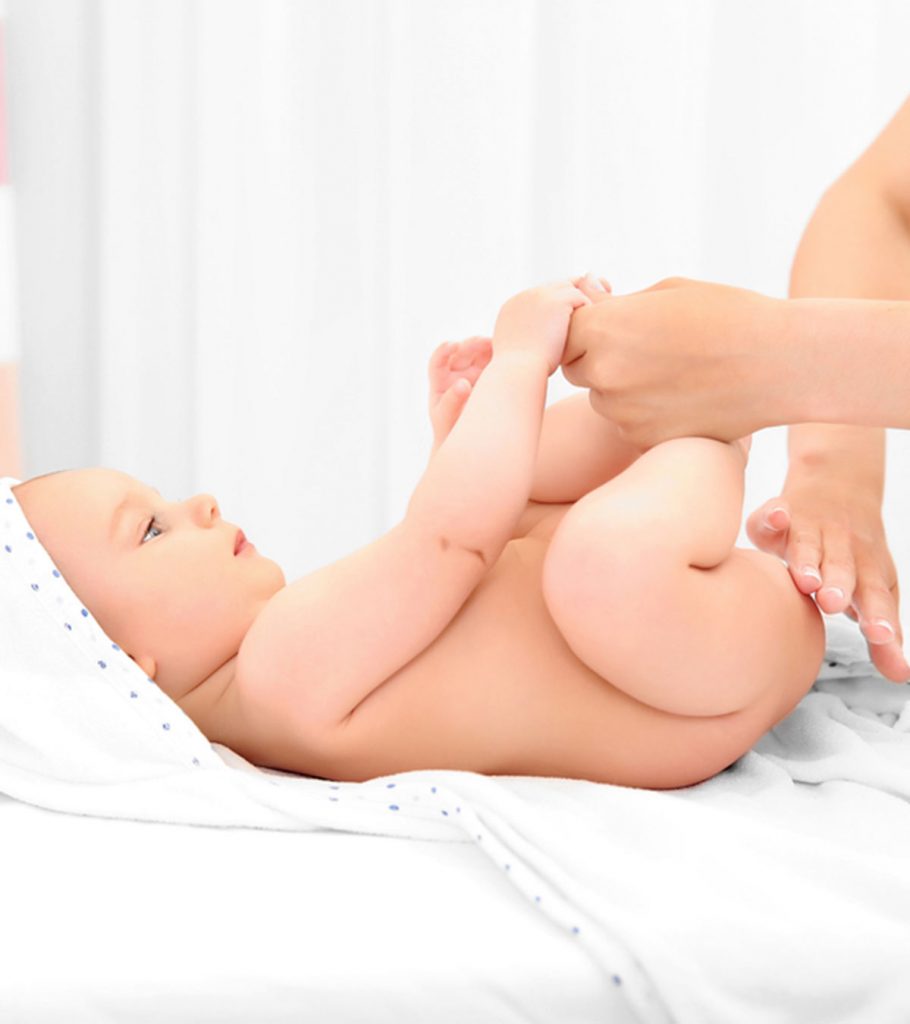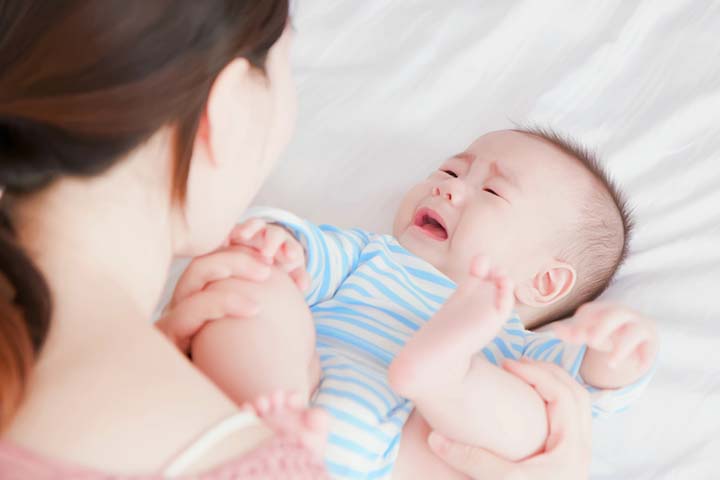A baby inside the womb is exposed to the mother’s hormones. Exposure to these hormones may increase the chances of vaginal bleeding in newborns, along with some other causes.
The appearance of blood-like vaginal discharge on the baby’s diapers could concern the parents. However, it is considered normal in most cases (1). Keep reading to know the various reasons for vaginal bleeding in newborns and when you should be worried about it.
Is Newborn Vaginal Bleeding Normal?
Vaginal bleeding due to maternal hormones’ effects is often a normal occurrence in newborn baby girls, although not all babies may experience it.
During pregnancy, women have high estrogen levels, and this hormone can pass through the placenta to the baby. Newborn baby girls may experience the following hormonal effects (2).
- A small amount of bloody discharge/bleeding from the vagina.
- A white fluid discharge from the vagina (also known as physiologic leukorrhea).
- Labia (skin tissue around the vagina) may look fluffy.
Newborn vaginal bleeding is called prepubertal vaginal bleeding or false menses. A baby girl usually experiences it anytime within the first month, although it may be more common during the first ten days. The bloody discharge could last for a day to ten days and goes away on its own. It does not cause any pain or symptoms in the baby.
What Are The Other Causes Of Newborn Vaginal Bleeding?
There could be other reasons for newborn vaginal bleeding, which are usually a cause for concern. Below are some conditions that may lead to newborn vaginal bleeding (3) (4).
- Pediatric vulvovaginitis: Vulvovaginitis is the inflammation of the tissues of the vulva and vagina. Several conditions or factors may cause it. Newborns may experience inflammation due to constant friction with clothes, infections, such as yeast diaper rash, wearing a soiled diaper for too long, or side effects of skincare products. The irritation due to inflammation may cause the baby to scratch the region often, leading to genital bleeding or blood spots. Other symptoms of possible vaginal infection could include yellow or brown discharge, fever, and pain.
- Sexual abuse or trauma: Blunt genital trauma may occur due to accidental falls while playing and is usually unintentional. Sexual abuse is a worrying cause and could be indicative when accompanied by hymen injury, intravaginal bleeding, perineal tear, and bruises on other body parts. According to a study conducted by the Centers for Disease Control and Prevention, there are reports that one in four girls in the US experience child sexual abuse.
When To Contact Your Doctor?
Consult a doctor for an evaluation of your baby’s vaginal bleeding in the following scenarios.
- The bleeding continues for more than ten days.
- The baby appears to be in pain whenever the bleeding occurs.
- The quantity of bloody discharge seems to increase gradually.
- The baby has signs of infection, such as fever.
- The vulva appears inflamed or there is foul-smelling discharge.
- The vaginal bleeding began after a fall.
- The baby shows possible signs of abuse, such as injuries to the genital areas and bruises.
How To Clean A Baby’s Vagina?
Vaginal bleeding in female infants does not require any special cleaning or care since the condition resolves on its own. Below are some ways to keep the baby’s genitalia clean (5).
- Clean the labia with non-fragrant wet wipes or warm water and cotton cloth or cotton ball.
- Always gently wipe from front to back to prevent any fecal matter from reaching the vulva.
- Do not aim to make the area excessively clean since it could lead to vaginal irritation.
- Avoid using soap on the baby’s genitals since it can disturb the natural pH balance, making the genital area dry, itchy, and irritable.
- A small quantity of clear or milky discharge is common in some babies, and you need not clean it. However, if the vaginal discharge is frequent, smells foul, or its quantity increases, consult a pediatric gynecology specialist.
Other Genital Concerns In Babies
Below are a couple of common genital-related problems or anomalies in babies (6) (7) (8).
- Labial adhesion: It is also called labial fusion and affects 2% of female infants. It may more commonly occur in the second year. In this condition, the two inner lips (labia minora) of the vagina fuse together. It could make urination difficult and may increase the risk of urinary tract infections. The condition could be resolved through the application of doctor-prescribed topical estrogen cream. Severe cases may require surgical correction and restoration of the labia.
- Urate crystal: Uric acid crystals in a newborn’s urine may appear red, pink, or orange in color. This condition can affect around 22% of breastfed infants in the first few weeks after birth. It affects both boys and girls. The appearance of uric acid crystals is normal and usually a byproduct of the urate and calcium present in urine. The crystals appear for a few days but could be a cause for concern if shed for several days. It is best to consult a doctor to diagnose the condition and rule out other problems.
Although uncommon, newborn vaginal bleeding can occur in some baby girls due to exposure to the mother’s hormones. Pediatric vulvovaginitis and genital trauma can also cause vaginal bleeding in newborns. In most cases, vaginal bleeding isn’t a cause for concern and resolves within a few days. However, you should consult a pediatrician if the vaginal bleeding persists for more than ten days or is accompanied by other symptoms, such as pain, fever, or foul-smelling discharge. A doctor will diagnose the precise cause and suggest appropriate treatment accordingly.
Key Pointers
- Vaginal bleeding is seen in some newborn baby girls within the first month of birth.
- Possible causes could be maternal hormone effects, inflammation, diaper irritation, or reactions to skincare chemicals.
- Bloody discharge in an infant usually lasts for a couple of days and resolves spontaneously.
- However, if the baby develops a fever and the bleeding increases, and does not stop after ten days, seek medical help immediately.
Learn about the potential causes of newborn vaginal bleeding, when to be concerned and care tips for the same from a medical expert.













